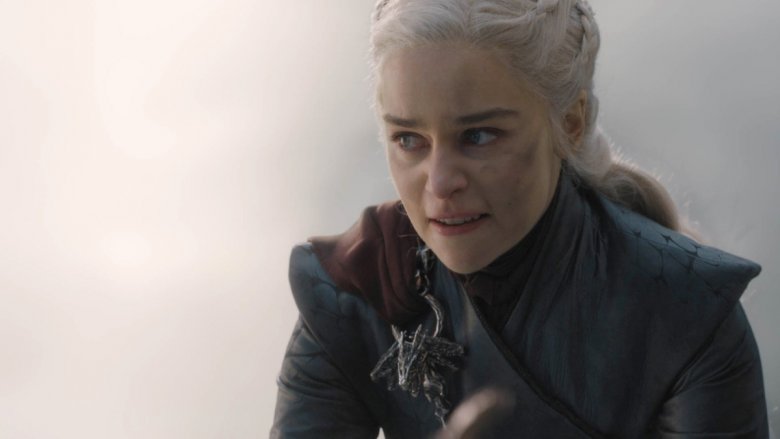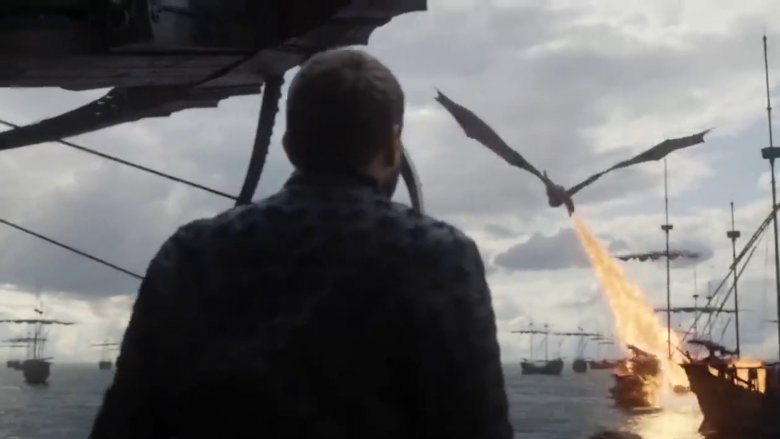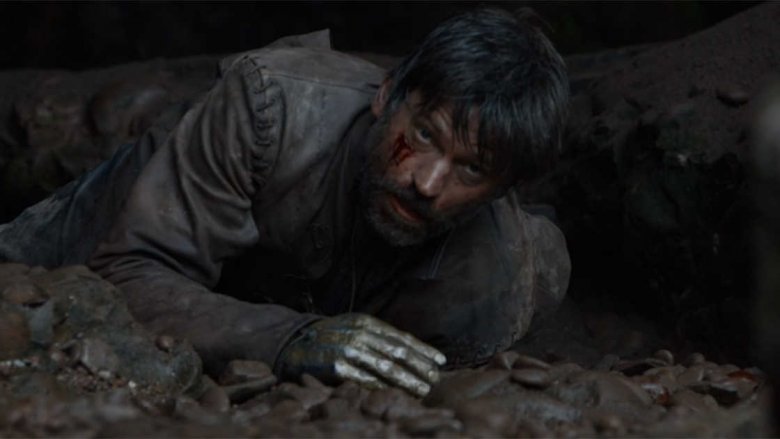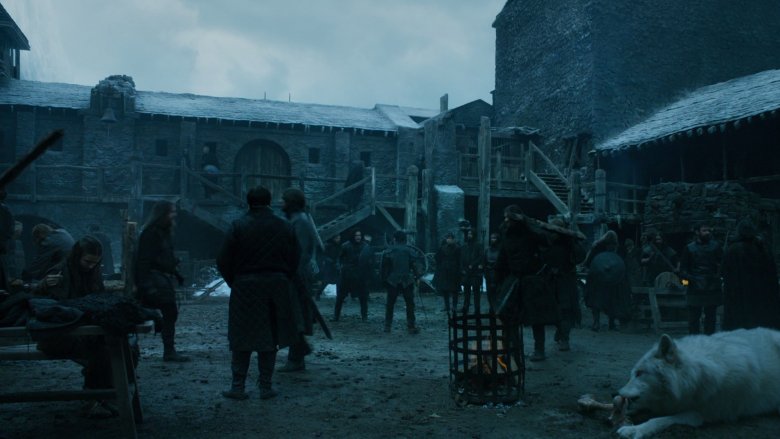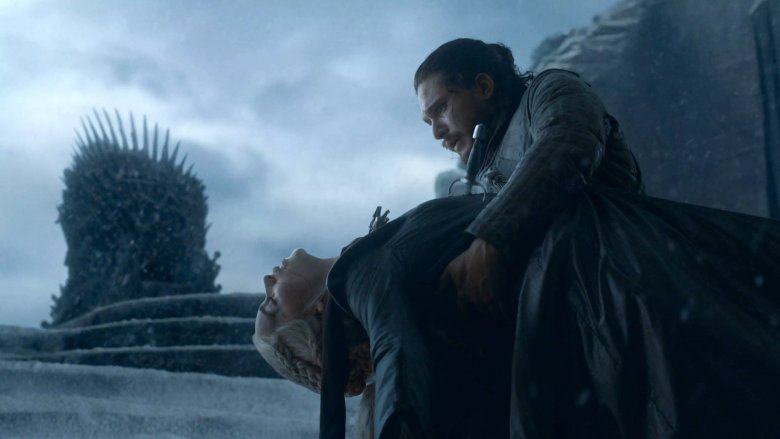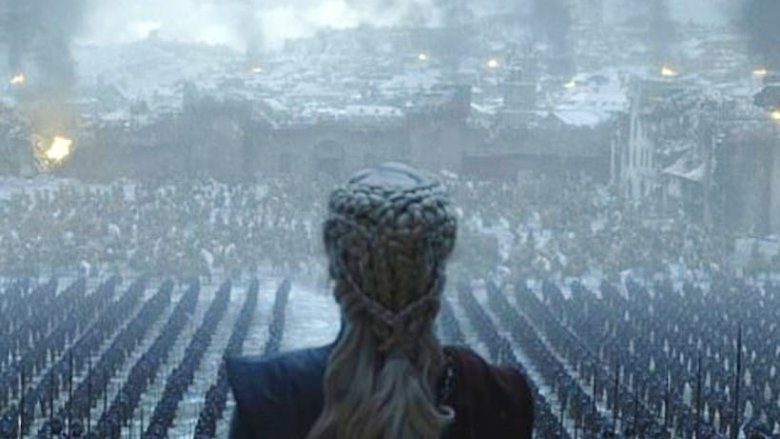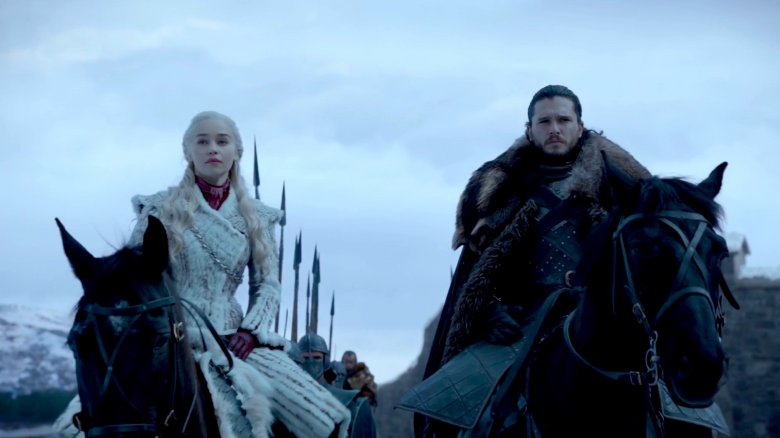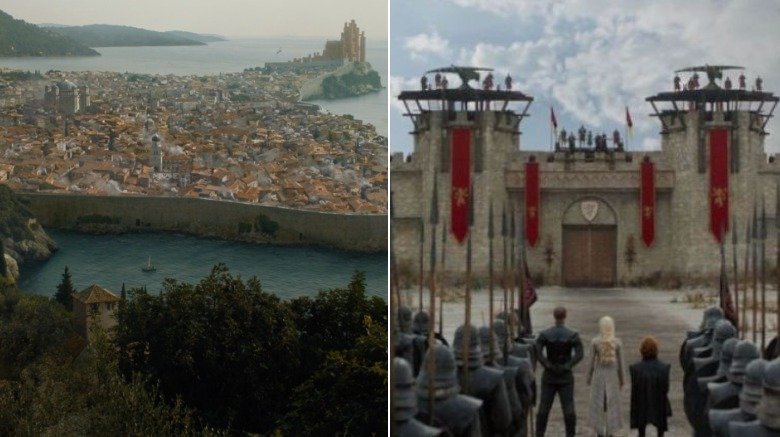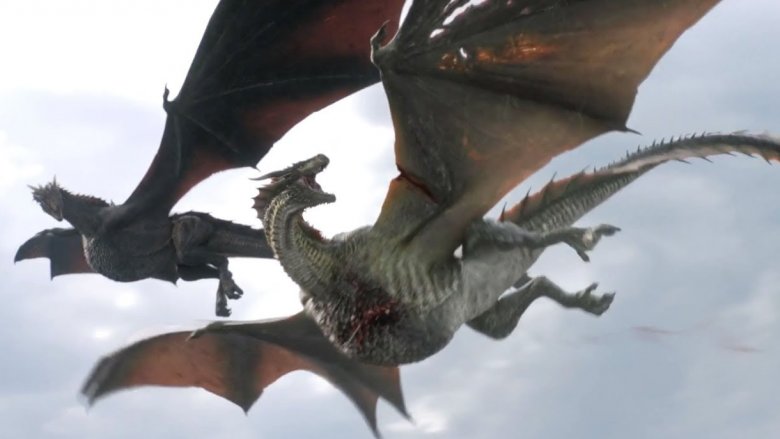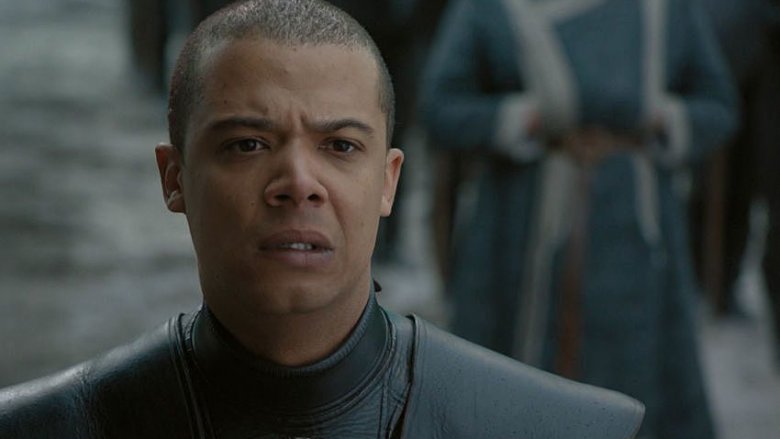Game Of Thrones' Biggest Plot Holes
Throughout its eight-season run, Game of Thrones was one of the densest and most complex shows on television, with a twisting narrative, an enormous cast of characters (often with names that were increasingly difficult to spell), and a sprawling world, giving fans plenty to chew on when it came to its intricate plotting and huge twists and turns. During its final season in the spring of 2019, the series delivered its highly-anticipated conclusion to a pretty tepid reception, with the creators seeming to have a little trouble making sure they took care of a bunch of their narrative threads.
Because the show is so complex, there are bound to be a few loose ends and plot holes bouncing around, and with its final outing, Thrones introduced plenty more plot holes fans can agonize over throughout every rewatch. Here are just a few of the biggest plot holes in Game of Thrones. Spoilers to follow!
Euron's men are mutes no more
Euron Greyjoy is absolutely one of the more irritating features of the later seasons. Introduced in the sixth season as a new villain aligned with Cersei, the over-the-top, bombastic usurper to the throne of the Iron Islands ends up with a little too much screen time as he guides his fleet to Cersei's defense against Daenerys and her dragons. After Euron successfully leads an attack on Daenerys and her forces, Daenerys goes for Euron's armada on her way to the siege on King's Landing, swooping in on Drogon to torch the entire fleet.
She manages to pull it off, but if you listen closely to the scene, you'll hear men yelling, which wouldn't be so out of the ordinary during a dragon attack except for one important detail. Euron's entire crew is made up of mutes, which he has directly addressed over the course of multiple episodes, including when he tells his captive cousin Yara he only keeps her alive because she can speak. This was only a few episodes prior, so why is it that Euron has suddenly forgotten all about it?
It's only a flesh wound
Nobody wants the main characters of Game of Thrones to suffer any more than they have to, but for a show that made a name for itself by killing its darlings, it somehow got into a bad habit of making sure its main characters never even batted an eye at an injury — even ones that seemed like they could be life threatening.
The first big example of this happens back in the show's sixth season, when Arya breaks the rules during her training with the Faceless Men and ends up chased by the mysterious Waif, who has been sent to kill her. After the Waif repeatedly stabs Arya in the stomach, it seems like she must be done for. Instead, she plunges into a nearby canal and somehow makes it all the way to a friend's house for medical attention before fighting the Waif again (and winning this time). If this had only happened once, it might be easier to overlook, but in season 8, Jaime ends up with the same magical non-threatening stomach wounds after a fight with Euron, where the latter delivers several punishing knife blows to the Kingslayer's gut. Even so, Jaime makes it all the way to the Red Keep to reunite with Cersei while still bleeding pretty profusely. At least viewers now know that if you're a main character with a stomach wound, you're pretty much guaranteed to survive the scene.
Unfulfilled prophecies abound
Appropriately for a show with such a mystical, magical setting, Thrones is rife with prophecies from beginning to end, which gave viewers plenty to mull over in between seasons. Questions about Daenerys' fertility, Cersei's eventual killer, Arya's destiny, and the identity of Azor Ahai and the Prince(ss) Who was Promised ran rampant for eight seasons, and fans were excited to receive some closure about at least some of these prophecies in a way that would solve some of the show's biggest mysteries.
In an unsatisfying twist, none of these prophecies were ever officially confirmed. Daenerys dies without ever knowing if she could bear children. Cersei isn't killed by a "valonqar" or little brother at all, but anticlimactically crushed by falling rocks. Arya never kills anyone with green eyes. Azor Ahai and the Prince(ss) are never mentioned and certainly never identified.
Diehard fans can probably find ways to confirm some of the prophecies or discern why they weren't cleared up — the "valonqar" theory regarding Cersei was never directly mentioned in the show, but Tyrion is the reason she was underneath the Red Keep in the first place, and Jon Snow killing Daenerys could be twisted to make Azor Ahai work — but the fact remains that for all the time the show spent on these in previous seasons, they seemed to simply vanish for the grand finale.
The Night's Watch no longer has a purpose
As punishment for killing Daenerys (even though the Mad Queen likely would have killed thousands more innocent people in her quest for world domination), Jon Snow is banished to Castle Black for the rest of his life to serve in the Night's Watch, bringing him right back where he started. That would be all well and good — and maybe even a poetic ending for Ned Stark's bastard turned secret Targaryen who will now be hidden away at the Wall — except for one glaring problem.
Now that the Army of the Dead is done for (thanks to Arya) and peace has been brokered between the wildlings and citizens of Westeros (thanks to Jon), there doesn't seem to be any point to the Night's Watch at all. Jon apparently feels the same way, asking Tyrion why the Night's Watch exists, but since he doesn't get an answer, neither do viewers, leaving them in the dark about why Jon would have to take the black again. However, in the closing moments of the finale, Jon, Tormund, and Jon's direwolf Ghost are seen riding north of the Wall surrounded by Wildlings, leading some to believe that Jon is on his way to becoming the King Beyond the Wall, which could potentially mean the Night's Watch is over. However, with this unconfirmed, there's just no good reason for the Night's Watch to stick around.
The magical multiplying Dothraki
Right at the beginning of the Battle of Winterfell, Daenerys finds herself at a serious deficit. Even though Melisandre helpfully arms the Dragon Queen's Dothraki army with flaming swords for the charge at the Army of the Dead, in one of the most chilling sequences of the entire series, viewers and characters alike watch in horror as the flames are quickly and quietly snuffed out. Only Jorah Mormont, Ghost, and a few straggling Dothraki escape the massacre at the hands of the dead.
With that in mind, most viewers assumed that the Dothraki army, nearly all of which has followed Daenerys from Vaes Dothrak, was basically extinct in the aftermath of the Battle of Winterfell. But in the three episodes that followed, something pretty weird started happening. More and more Dothraki kept popping back up, seemingly multiplying by the episode, until the series finale, when Daenerys gives a rousing speech to the rest of her Unsullied army (which is also still oddly huge) and an enormous crowd of whooping Dothraki warriors. Unless this is a secret Dothraki power viewers never found out about, Daenerys definitely shouldn't have that many Dothraki soldiers left by the show's end.
Time is a flat circle
At the beginning of Game of Thrones, with so many characters setting off on various missions and quests, long journeys were a de facto plot point on the show. Westeros isn't exactly a small place, and the journey from Winterfell, which is all the way in the North, to King's Landing, which is pretty far south, would definitely take considerable time. If you keep in mind how long it took Daenerys to cross the Narrow Sea and get to Westeros in the first place, it's clear that journeying around this world is no small feat.
However, during the show's later seasons, people seem to pop up ridiculously quickly pretty much wherever they want (or as the plot demands), completely skewing how both time and space work in the Seven Kingdoms and beyond. During an episode in season seven, one character runs across a huge expanse of land beyond the Wall to send a raven, which apparently moves at warp speed considering how quickly Daenerys receives the message and arrives to save the day. In season eight, it gets even worse, with characters zipping from Winterfell to Dragonstone to King's Landing in basically no time at all (Euron couldn't possibly swim that fast). Moving the plot along at a brisk pace is certainly necessary, but the over-the-top travel speed in Thrones' final seasons is just too big of a plot hole to ignore.
Did King's Landing move?
The capital city of Westeros, the gorgeous city of King's Landing is described as sitting directly on the sea. Luckily, a city that shares plenty of characteristics with King's Landing actually exists and served as its filming location. After shooting some scenes in Malta during the first season, production for the King's Landing scenes moved to Dubrovnik, Croatia, which remained the stand-in for the Seven Kingdoms' capital for the remainder of the show, and it's easy to see why. With its pastoral surroundings and stunning architecture, the Jewel of the Adriatic is the perfect real-life mimic for King's Landing.
However, during a stand-off in the show's eighth season, King's Landing seems to have radically changed, and is now surrounded by a huge swath of desert rather than the green, lush entryway seen in prior seasons. If this is an attempt to indicate that the city's natural resources are dying, it's never addressed or explained. As it stands, it's just a weird inconsistency that the showrunners surely should have known viewers would notice.
Euron's temporarily great aim
Daenerys' dragons are some of the most important and prized creatures in all of Game of Thrones. Many characters don't even believe dragons still exist until one of Daenerys' "children" appears in front of them. After losing one to the powerful and undead Night King, Daenerys is down to only two dragons — her largest and favorite dragon, Drogon, and Rhaegal, named for her brother.
During the eighth season, however, she's reduced to just Drogon after Rhaegal is almost immediately shot out of the sky by Euron (from a moving boat, no less), who becomes the first-ever human to kill a dragon. Some viewers might be able to attribute that to his unerring skill with a scorpion (a giant ballista that can shoot enormous spears into the sky), but in the very next episode, Euron is suddenly completely incapable of aiming at Drogon, who, as the biggest dragon, should be easier to hit for such a skilled marksman. Between episodes, Euron seems to have gotten worse at shooting and Drogon seems to have become invincible. Even surrounded by scorpions, Drogon torches the entire fleet and half the city with absolutely no problem, leading viewers to wonder how and why Rhaegal went down so easily in the first place.
The new kids in town
With Daenerys murdered and a new leader chosen, one huge question remains — what happens to her two enormous foreign armies in the wake of Khaleesi's death? The Unsullied and Dothraki are both fiercely loyal groups dedicated to the Dragon Queen, and as far as the Unsullied are concerned — at least, according to their leader Grey Worm — Jon should pay for the ultimate crime of queenslaying (the magically-expanding Dothraki army never makes an official statement on the death of their queen). However, in the end, Jon is permitted to join the Night's Watch, the Unsullied sail to protect Naath (keeping a promise Grey Worm made to Missandei), and the Dothraki... well, nobody's super clear on what happens to the Dothraki. How either army allowed Jon Snow to leave the city unscathed is pretty confusing, too.
It seems pretty unlikely that all of Daenerys' forces, who are furious that their queen died, would quietly accept a brand new ruler whose brother is the one who killed her in the first place. Both the Dothraki and Unsullied armies are known for their eternal loyalty, and it seems like with the North weakened, they could probably hold the city on their own. Instead, the armies either do nothing or leave quietly in the aftermath of their beloved leader's death, which feels not only anticlimactic, but just straight-up baffling.
